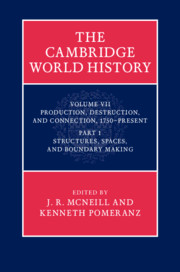Book contents
- The Cambridge World HistoryVolume VII
- The Cambridge World History
- Production, Destruction, and Connection, 1750–Present
- Copyright page
- Contents
- Figures
- Maps
- Tables
- Contributors
- Preface
- 1 Production, destruction, and connection, 1750–present: introduction
- Part I Material matrices
- Part II Population and disease
- Part III Politics
- Part IV World regions
- 18 The Middle East in world history since 1750
- 19 East Asia in world history, 1750–21st century
- 20 Latin America in world history
- 21 Africa in world history
- 22 The United States in world history since the 1750s
- 23 The economic history of the Pacific
- Index
- References
20 - Latin America in world history
from Part IV - World regions
Published online by Cambridge University Press: 05 May 2015
- The Cambridge World HistoryVolume VII
- The Cambridge World History
- Production, Destruction, and Connection, 1750–Present
- Copyright page
- Contents
- Figures
- Maps
- Tables
- Contributors
- Preface
- 1 Production, destruction, and connection, 1750–present: introduction
- Part I Material matrices
- Part II Population and disease
- Part III Politics
- Part IV World regions
- 18 The Middle East in world history since 1750
- 19 East Asia in world history, 1750–21st century
- 20 Latin America in world history
- 21 Africa in world history
- 22 The United States in world history since the 1750s
- 23 The economic history of the Pacific
- Index
- References
Summary
Keywords
- Type
- Chapter
- Information
- The Cambridge World History , pp. 526 - 555Publisher: Cambridge University PressPrint publication year: 2015

